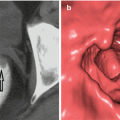© Springer International Publishing Switzerland 2015
Omer Engin (ed.)Colon Polyps and the Prevention of Colorectal Cancer10.1007/978-3-319-17993-3_88. Follow-Up of a Pregnant Patient During Colonoscopy
(1)
Gynaecology and Obstetrics Department, Tepecik Training and Research Hospital, Izmir, Turkey
There are changes in a number of physiological systems during pregnancy. These changes are more prominent in the gastrointestinal system, in particular. The effects of growing uterus are displacement of abdominal tissues, decreased pressure within the oesophagus, increased intragastric pressure, and simultaneously, decreased lower oesophageal sphincter tonus, hence, increased tendency for vomiting and aspiration. This situation facilitates aspiration of gastric contents under general anaesthesia and deep sedation. Haemorrhoids are frequently seen during pregnancy due to constipation and compression caused by the uterus. Knowing these anatomical and physiological maternal changes prior to colonoscopy is important for the medications that would be administered during the procedure.
Endoscopies should be performed by experienced endoscopists during pregnancy and the patient should be evaluated by an obstetrician prior to the procedure. Endoscopies or colonoscopies should be performed in hospitals that have a neonatal care unit and a perinatology unit with regard to the possible complications that might develop. On obstetrical consultation, the determination of gestational age, a detailed history of previous pregnancies, high-risk pregnancy situations, presence or lack of previous premature birth, pregnancy loss, and medical history should be evaluated. After informing the patient on fetal and maternal risks related to the procedures that will be performed, written informed consent should be obtained.
The most appropriate time for colonoscopy during pregnancy is the second trimester, as is the case with all other surgical procedures. However, it can be performed in the first and even in the third trimester in vital situations [1]. While teratogenicity related to the drugs and radiation and abortus become a source of concern due to fetus development in the first trimester, complications such as preterm delivery, intrauterine fetal loss, uterine injuries, hypoxia, and hypotension become sources of concern in the third trimester.
During maternal assessment before the procedure, haemodynamic stability of the mother should be provided, if present, anaemia and coagulopathy should be corrected, the factor deficiencies that would increase the bleeding tendency should be replaced, and fluid and electrolyte deficiencies should be corrected [2]. The fetal heart rate should be recorded and the reserve of placental circulation should be determined with Doppler ultrasonography before and after the procedure. According to American Society for Gastrointestinal Endoscopy (ASGE) recommendations, monitorization of the fetal heart rate with fetal Doppler before and after colonoscopy is thought to be sufficient before 24 weeks of gestation; however, in pregnancies after 24 weeks, monitorization of uterine contractions in addition to fetal heart monitorization should be done before, during, and after the procedure [3]. This enables the early diagnosis and early management of fetal distress caused by hypotension and hypoxia. During pregnancy, maternal-fetal circulation cannot immediately adapt to sudden alterations in blood pressure. As such, the fetus is sensitive to hypoxia and hypotension. In high-risk pregnancies, colonoscopies should be performed by the evaluation of each patient individually in terms of malignancy and lower gastrointestinal bleeding. If it is possible to delay the procedure, it should be cancelled till second trimester or after birth.
Stay updated, free articles. Join our Telegram channel

Full access? Get Clinical Tree





